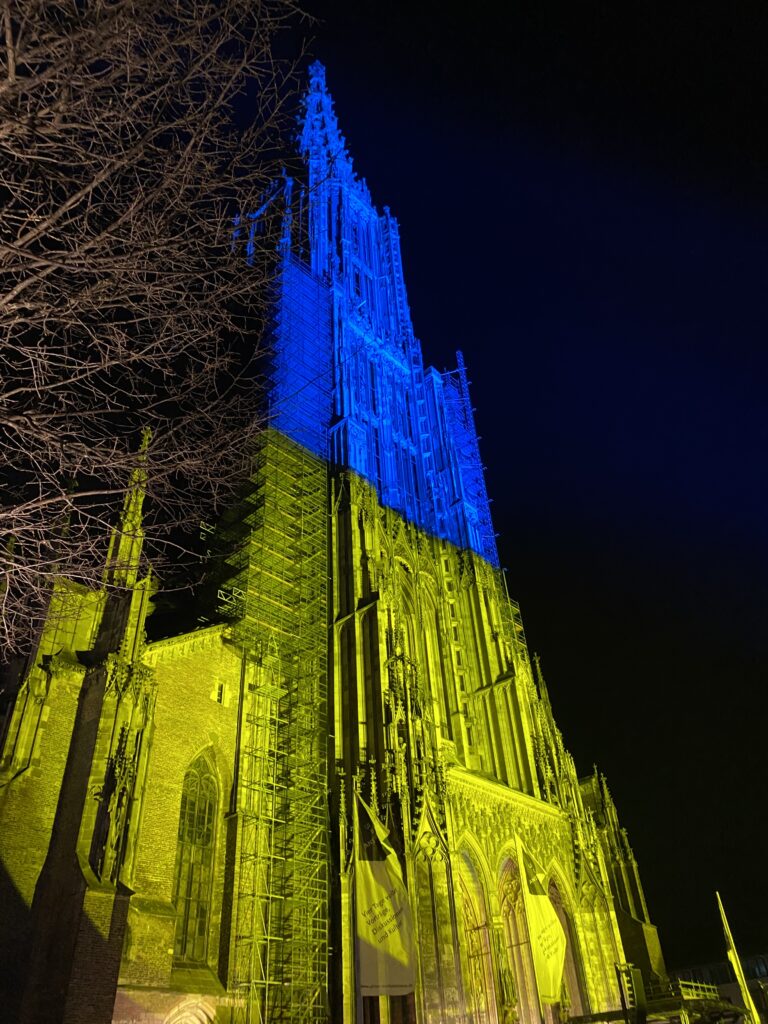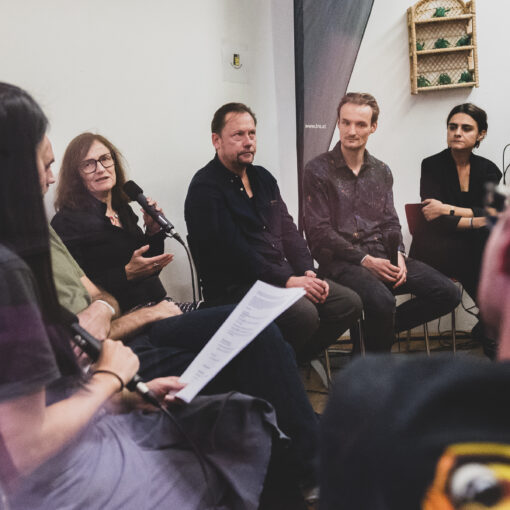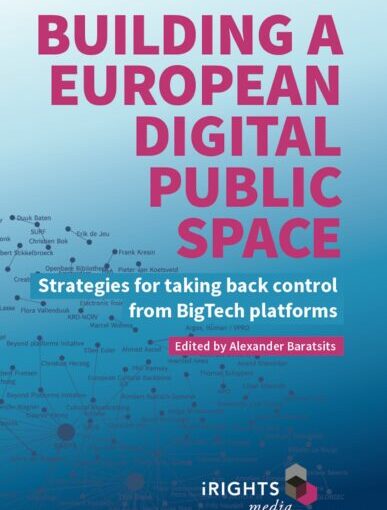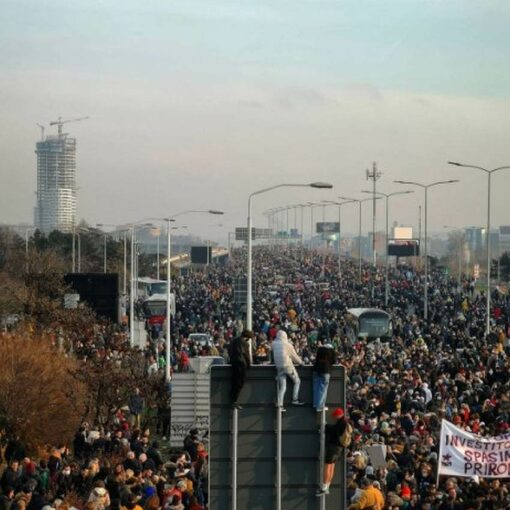An interview with Professor Dr. Dejan Ajdačić
Yemen, Israel, Palestine, Afghanistan, Myanmar, Haiti, Ethiopia, Libya … Can we immediately and at the first glance associate these countries? This question appears over and over in a similar form when the new war conflicts break out, or the old ones heat up. But when war breaks out in the immediate neighbourhood, attention increases. Even though most of us Europeans may not immediately make a direct connection between the countries mentioned, adding Ukraine to the “list” immediately solves a potential dilemma. The current war on the territory of this country raises old questions about solidarity, Eurocentrism, the achievements of European and American politics, and the achievements of capitalism. Does it matter at all where, how and to what extent war is waged as long as there is war somewhere in the world? The countries of the European Union had time to “practice” very fragile solidarity during the pandemic years. Russia’s war intervention in Ukraine united Europe in the fight against Putin’s aggression.
We talk to Dejan Ajdačić, Slavist, ethnolinguist, translator and cultural activist from Belgrade/Serbia, about whether this common position of the EU and almost the whole world is a belated reaction of a postponed reflection and what cultural-historical context shapes the relations between the two countries. Through his scientific and cultural activities, Professor Ajdičić unites the cultures of Eastern, Western and Southern Slavs. Dejan Ajdačić taught at Taras Shevchenko University in Kiev for more than a decade. The war in his second, Ukrainian homeland caught up with him in neighbouring Poland, where he teaches Slavic and Balkan studies at the University of Gdansk.
Radio free FM: Mr Ajdačić, you have been dealing with contexts and authentic peculiarities of Slavic cultures for a long time, both consistently and passionately. You know the situation in Ukraine very well. How did the Crimean crisis and the events in the disputed territories of Donetsk and Luhansk come about?
Dejan Ajdačić: The back story has not been about Ukraine and Russia only. In its actions, Russia has turned the aggressions that Western countries called “exceptions” in violation of international law and security into a permissible “norm”, firstly by its occupation of the part of Georgia in 2008 and then by the annexation of Crimea and occupation of Donetsk in 2014. Now in 2022, it is realising this new, previously unpunished norm by invading Ukraine from several directions.
The breakdown of neighbouring Russian-Ukrainian interstate relations was predetermined by Russia’s support for the greedy representative of Russian interests and the interests of the Donetsk clan. Protests against the avoidance of legal proceedings to limit the president’s powers were turned into a massacre by Yanukovych’s police in February 2014, after which he fled. In the ensuing chaos, Russia annexed Crimea with the participation of “little green men” and conducted military landings through Crimea and referendum patterns as a new “norm” of international law, that was implemented in Kosovo in 2008, for the first time. Separatists from the Donetsk region occupied part of this region with the participation of the Russian army, while Russia “justified” this conquest by protecting its inhabitants from Ukrainian Nazis.
Radio free FM: Did you expect such a development?
Dejan Ajdačić: I didn’t expect an attack by the Russian army at all, even though troops were piling up on the borders all winter. I thought it was a “clatter of arms” with the aim of exerting pressure in behind-the-scenes negotiations with Western leaders. I understood the recognition of the L/DNR as independent states on 21 February as Russia’s withdrawal from the mine agreements and Putin’s “small victory”, which included “small sanctions” from the outset. Frankly, I naively thought that an attack from Donetsk only would be an entrance to the tunnel without the possibility of retreat. The war of conquest launched by the Russian Federation on 24 February was euphemistically called a “special operation”. The naming of the operation’s objective – the denazification of Ukraine – testifies to the total change in reality. The gap between words and deeds is growing, and Russian stereotypes in dealing with Russian propaganda are becoming more and more absurd. Until now, Russians called Kiev the “mother of Russian cities”, and now Russian tanks will choke or bomb to rape the mother of their cities. The Russian army started denazifying what they called “Slavic brothers”. But since magic wands or denazification devices have not yet been invented, they kill these brothers. The lies of Russian propagandists about the alleged love for Ukrainians and the alleged peacefulness of the Russian army can only fool “blind”, “deaf”, completely zombie-like people who have stopped thinking.
According to military analysts, the “special operation” is planned as a blitzkrieg. It is clear that the Russians are not welcome. In eastern Ukraine, where there are most ethnic Russians, a Russian-Russian split on the line “against Putin” and “for Putin” has already taken place after the occupation of part of the Donetsk region.
The occupation of the whole of Ukraine as a set goal seems unlikely to me, and with each new crime against the Ukrainian population and the destruction of houses, hatred will continue to grow without the possibility of forgiveness. Ukrainians in the occupied territories will have a hard time while getting rid of the “bad blood”, which is already a burden in the mutual relations between the two nations. I feel sincerely sorry for the Russians in Russia who are against the invasion of the Russian army and the war in Ukraine because they are doubly isolated and punished. They are victims of their own government and collateral victims of sanctions and denial of opportunities because of other people’s sins.
Radio free FM: The situation in Ukraine is changing from hour to hour. What is the life of the citizens of Kyiv like at the moment and what are your expectations from the EU?
Dejan Ajdačić: In places and cities that are suffering the attack of Russian troops, the situation is extremely difficult. So called the “war dogs”, who were promised unpunished robbery, stormed Kiev, Kharkiv and other unconquered cities to loot and sow death. The Russian army, supposedly tasked with disarming Ukraine from afar with projectiles, is killing civilians with the cluster and other banned weapons, targeting children’s hospitals and maternity clinics, destroying gas pipelines and heating plants, destroying the electricity grid, shelling TV towers and apartment blocks. Schools and universities, cultural and economic institutions are closed. Prices rise, some food becomes harder to access. The inhabitants of Ukraine hear sirens and the sound of explosions, feel the soot of burnt warehouses and houses, hear news about dead, wounded, fled compatriots, are afraid of bombings and street fighting. Data collection for the International War Crimes Tribunal has begun. A week after the beginning of the aggression, there are unfortunately already many documents about the inhuman performance of the Russian troops.
The European Union has taken unexpectedly quick and effective steps to support Ukraine and the Ukrainian people. European countries have taken in large numbers of refugees, mainly women and children. The world is helping Ukraine, but Ukrainians need even more help.
“Ukrainians are currently defending not only their human dignity, but also the dignity of all humanity. Ukraine is now defending our freedom and our dignity. And we have a duty to do everything we can to help her.”
Mikhail Shishkin, Russian writer
Radio free FM: How would you briefly describe the connection between Russian and Ukrainian culture, if it is at all possible to briefly describe this complex relationship?
Dejan Ajdačić: It is not possible to briefly describe this relationship because, despite their proximity, they sometimes fruitfully supported and sometimes confronted each other. The most powerful medieval state, Kiev, adopted Christianity and Cyrillic as its Slavic alphabet. If someone wants to look for dialect lines in old manuscripts, he will certainly find recognisable features of the southern dialects of the Eastern Slavs of that time.
When the Russian Empire invaded the land of the ancestors of today’s Ukrainians at the beginning of the 18th century, it suffocated the Cossack state and its culture. After the great and fruitful Ukrainian-Russian and Ukrainian-Polish closeness during the period of romanticism, the love for the melodic language of the South, Gogol’s Tales from Dikanjka, whose Russian text contains many folk songs, sayings and realities of his native Poltava region, dark times came. Since the mid-19th century, the Russian Empire’s language policy has been aimed at persecuting the Ukrainian language, as evidenced by restrictions and bans, including the Valuev Circular, which forbade the publication of books in the Little Russian language. The Russian Empire did not recognise any uniqueness of Ukrainians and declared them Russians.
Radio free FM: Vladimir Putin claims in his wartime propaganda that the Russian language is suppressed, even in areas with a majority Russian population. How does this look from the perspective of a philologist?
Dejan Ajdačić: Many Ukrainians speak both Russian and Ukrainian. Language protection is a false excuse for this aggression. The Russian people of Ukraine have not asked the Russian state and the Russian army to protect their endangered language rights.
Radio free FM: Please recommend a contemporary Ukrainian author to our readers and listeners.
Dejan Ajdačić: Ukrainian literature is an interesting one, profiled by genre and diversity. Many works by contemporary Ukrainian authors have been translated into German, such as Yuri Andrukhovych, Yuri Vynnychuk, Maria Matios, Serhiy Shadan.
Radio free FM: It is thankless to make political predictions, especially in cases like this. On the other hand, of course, we all wish for an immediate end. How do you see the further development?
Dejan Ajdačić: When a powerful men sacrifice thousands of lives, it is difficult to predict what they will do next … The desire of most people to end the war immediately will unfortunately not lead to an immediate end to the war. The United Nations has no mechanism to exclude the right of veto for aggressor countries – members of the Security Council, which is already known from a number of wars. Therefore, it is obvious that the Russian invasion of Ukraine cannot be stopped by the decision of the Security Council. Russian aggression is rapidly destroying all remaining security mechanisms and reducing them to helpless and inert appeals. It is unlikely that the threat of nuclear weapons can lead NATO to new “Yalta” agreements on the division of zones of influence. Only unconditional ultimatums, the so-called minimum requirements, are still coming from Russia. Since Ukraine does not want to surrender unoccupied, this will bring new destruction and crimes in Ukraine and a prolongation of the war. This fact alone raises the question of whether there is any reason for the West to side militarily with Ukraine at the expense of a major conflict. But there is also a crossroads of Russian domination. I said that I could not imagine the limits of destructive intentions, but it is clear that there is also a limit to the durability of sanctions if one has a long war or an occupation with strong partisan resistance. A major expansion of the war could force the government of the Russian Federation into a separatist peace with concessions to Ukraine, but without a major agreement on the division of spheres of influence. Defeat for Russia is not impossible in the event of a complete demoralisation of the Russian army, a social revolt, a dissolution of the Federation or the participation of Ukrainian allies in the war.
At a time when people are dying, I want just peace and settlement to be reached as soon as possible, in the hope that reason will prevail.
Radio free FM: Thank you for taking the time to speak to Ulm Radio free FM listeners and readers at such a sensitive moment.
While prepaing this text, the total number of victims on both sides is rising. Refugee convoys are moving west in all directions, adding to the growing daily number of 84 million refugees worldwide. Germany and other countries are taking in refugees and providing the aid. But whether this will lead to a thorough review of the European project, i.e. a new concept of solidarity in the world, remains for the future … with the end of this and all other wars.
Olivera Stošić Rakić





